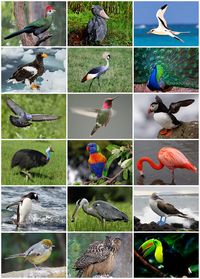
Photo from wikipedia
Abstract Creatine is a multifunctional organic acid necessary for various physiological processes and is commonly supplemented to improve muscle growth and performance of humans. However, the effects of supplemented creatine… Click to show full abstract
Abstract Creatine is a multifunctional organic acid necessary for various physiological processes and is commonly supplemented to improve muscle growth and performance of humans. However, the effects of supplemented creatine in the diets of fishes is unclear. Thus, two feeding trials were conducted to examine the performance of juvenile red drum fed diets supplemented with creatine. The first feeding trial was conducted for 7 weeks, to determine the optimal dietary supplementation of creatine for red drum at low (5 ppt) salinity. Red drum is a euryhaline species and potential benefits of creatine may include enhanced energy utilization during osmoregulation. Therefore, the second trial was a two-part, 12-week, feeding trial. During the first 7 weeks, salinity was maintained at 3 ppt (low salinity), then, for an additional 5 weeks, maintained at 15 ppt (moderate salinity). The basal diet for both feeding trials was formulated to contain 40% crude protein, contributed equally by menhaden fishmeal and soy protein concentrate, and 10% lipid. For trial 1, five experimental diets were derived from the basal diet by supplementing creatine at 0.5, 1, 1.5, 2, or 4% by weight at the expense of cellulose. The diets for trial 1 were adjusted with a 50/50 blend of aspartate and glutamate to maintain the diets isonitrogenous. For trial 2, the same basal diet and one supplemented with creatine at 2% were prepared with the creatine-supplemented diet adjusted with a 50/50 blend of aspartate and glutamate on an equal-weight basis. In trial 1, significant (P ≤ .05) positive trends were observed in weight gain, feed efficiency, and survivability of fish fed the diets supplemented with creatine. Broken-line regression analysis indicated creatine supplementation at 1.98% of diet provided optimal weight gain of red drum. In trial 2, there was a trending increase in percent weight gain and feed efficiency of fish fed the creatine supplemented diet during the moderate salinity portion of the trial, resulting in significant improvements over the 12-week period. Results from these study confirm that red drum benefit from dietary creatine supplementation in practical diets.
Journal Title: Aquaculture
Year Published: 2019
Link to full text (if available)
Share on Social Media: Sign Up to like & get
recommendations!